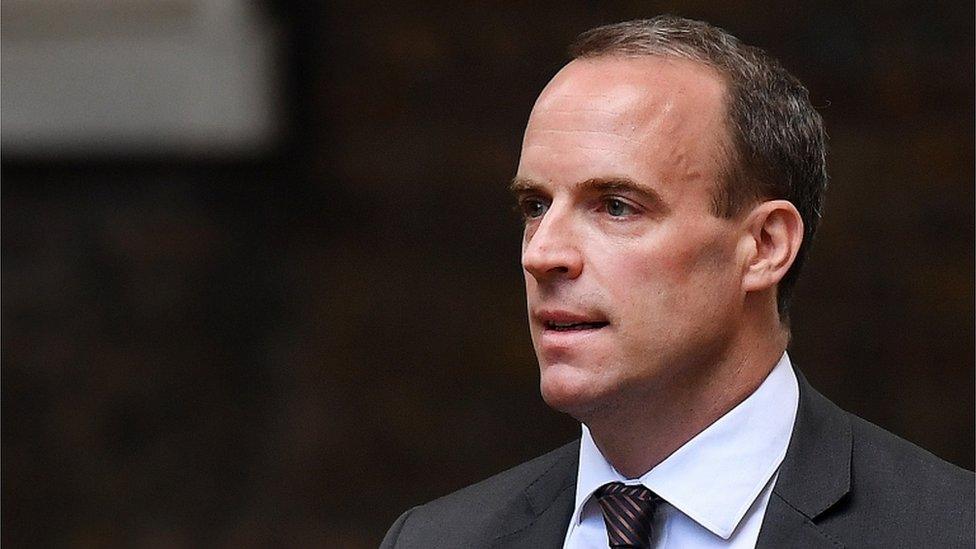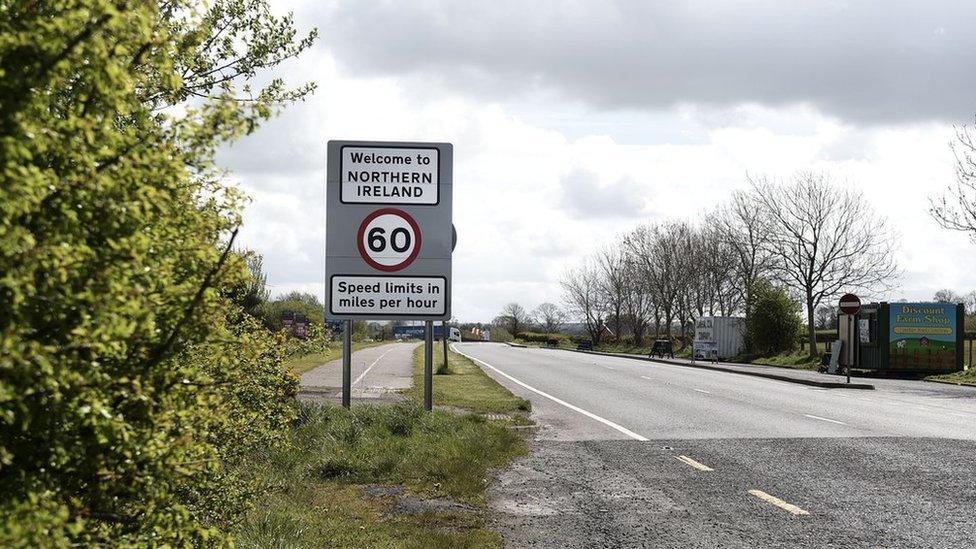Brexit: Border firms on edge over roaming charges uncertainty
- Published

The government has said it cannot guarantee that roaming charges will not return after Brexit
Uncertainty over what might happen to mobile phone roaming charges after Brexit is yet another unanswered question for Irish border businesses.
Last week's government guidance stated that in the "unlikely event" of a no-deal Brexit, surcharge-free roaming "could no longer be guaranteed".
The UK's biggest mobile firms have said they have no plans to reintroduce fees.
But until the Brexit deal is done, or not, customers are on hold, with border firms among the most vulnerable.
Karol Ryan owns KR Plant Sales and Hire, a heavy machinery business in Newtownbutler, County Fermanagh, about 550 yards (500m) from the border.

Karol Ryan said any move to reintroduce full roaming charges would have a significant impact
The 36-year-old businessman has "saved a fortune" since he changed to a new mobile provider which capped his roaming charges.
"My bills were mental," said the County Monaghan native, who employs 18 people across three premises on both sides of border.
'Inadvertent roaming'
His firm has five company mobiles and until recently, he used a Republic of Ireland operator and faced roaming charges of up to 800 euros (£710) per handset.
He has since switched to a UK operator which caps roaming bills at £25 per month, saving him "hundreds of pounds".
Mr Ryan said any move to reintroduce full roaming charges would have a significant impact on his business.
However, he added it is "hard to know" what will happen as a result of Brexit in this and many other aspects of cross-border trade.

KR Plant Ltd employs 18 people on both sides of border
He is particularly concerned additional paperwork could affect sales and said if it makes trading very difficult then he will "close my business down in the north" and concentrate on his Republic of Ireland premises.
Brexit guidance issued by the government last week, external made particular mention of mobile phone customers in Northern Ireland.
"Consumers and businesses in border areas should be aware of the issue of 'inadvertent roaming'," it stated.
"In this case, a consumer from Northern Ireland in a border region of Northern Ireland would roam onto an Irish network as the mobile phone signal is stronger from a network in Ireland."

Brexit Secretary Dominic Raab said he could not give a "cast iron guarantee" on roaming charges
Many businesses susceptible to inadvertent roaming have greatly cut their overheads since June 2017, when the European Union scrapped additional charges which kicked in when travelling to another EU country.
'Thousands of pounds'
They include A1 Transport NI Ltd in Derrylin, County Fermanagh, run by husband and wife Jisbinder and Anna Sembhi.
Mrs Sembhi founded the haulage company in 2001 with just three lorries. Now the couple operate about 50 lorries and employ around 40 people.
"If you go down the end of our road and you turn left you're in the south of Ireland, and if you turn right you're in the north," Mr Singh said.
"The vehicles are constantly going in and out of each jurisdiction."
What will become of the Irish border when the UK leaves the European Union?
He said the abolition of roaming charges saved their firm "thousands of pounds" over the past year, and led to them buying phones for every employee.
"We went from having 10 phones to everybody, as a direct result of what they introduced," Mr Sembhi said.
He said if roaming charges were reintroduced it "could have a potentially devastating effect" but added he would take evasive action.
"If the reverse cycle happened, all I would merely do is close the contracts and look for a provider who could satisfy our requirements."
'Scaremongering'
The haulier believes scrapping charges boosted phone sales, so operators will be reluctant to return to the days of expensive fees.
Mr Sembhi says so far he is reassured by statements from major networks that they do not intend to bring back roaming charges and accused the media of "scaremongering".

BBC News NI asked each of the UK's four mobile network operators their position on roaming charges:
O2: "We currently have no plans to change our roaming services across Europe. We will be working closely with the government and other European operators to try and protect the current arrangements so our customers can continue to enjoy free EU roaming once Britain officially leaves the EU."
Vodafone: "We were the first UK operator to abolish roaming charges within the EU and we have no plans to introduce these charges. We very much hope arrangements can be made which will ensure we can continue to offer UK consumers our roam-free service."
Three: "We're committed to eradicating excessive roaming charges and will retain this great customer benefit regardless of Brexit negotiations, allowing our customers to continue using their usual allowances when they travel within the EU."
EE: "EE customers enjoy great value products and controls offering inclusive roaming in Europe and beyond, and we don't have any plans to change these offers. We are working closely with government on this and hope they will put consumers at the top of their agenda in the Brexit negotiations to help ensure that UK operators can continue to offer low prices to our customers."

Border business leaders have appealed to the government and mobile operators to prevent the return of roaming charges, without or without a Brexit deal.
"The abolition of mobile phone roaming charges has been a real boost for businesses operating in the border area," says Colm Shannon, chief executive of Newry Chamber of Commerce and Trade.
"The charges were an unnecessary cost on business and a barrier to customers getting in touch.
"It is important that government secures a Brexit deal which avoids the reintroduction of these costly charges. In the absence of a deal, government must work with the mobile companies to avoid their reintroduction."

The future management of the Irish border is one of three main priorities in UK-EU Brexit talks
However, with just over six months until Brexit, the boss of A1 Transport is less concerned about roaming charges than he is about the lack of information on border trade.
"This is going to have a severe impact on us, because we still have to cross the channel and we still have to come into the country and we still have to drive in the south," Mr Sembhi said.
"Depending on the decision, it will mean 'do we turn right or do we turn left?'
"You can't plan against the impact because there is so much uncertainty," he added.
"I wish the government would make some decisions and give business owners some sort of direction."
- Published13 September 2018

- Published13 September 2018
- Published30 December 2020
